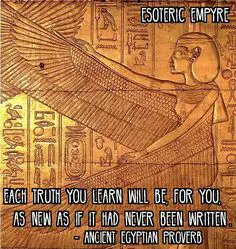Ancient Egyptian Sayings and the Evolution of Ancient Egyptian Language
Ancient Egyptian sayings had a lot of wisdom in them. The sayings depicted aspects of evolving humanity. Egyptian proverbs are still alive today. Their applications in the modern world are still valid.

Ancient Egyptian proverbs and sayings were inscribed on stones and walls. Archaeological pursuits have revealed many of these in the inner and outer walls of temples. Sayings inscribed on temple walls served the purpose of educating people on virtues of morality and humanity.
Egyptians believed in macrocosm. They believed that human beings were bestowed with the power of macrocosm. Meaning, people could look unto themselves to look beyond. Often understanding the self-was effective to understand and reach the target.
Many of ancient Egyptian sayings revolved around the concept of knowing oneself. This created a school of thought in the people’s mind to realize their own fallibilities. Understandably, ancient Egyptians were a highly aware people. They were intelligent, sophisticated and artistic.
A compilation of ancient Egyptian sayings and their associated meanings
The following are a short compilation of sayings from ancient Egypt with their brief explanations.
“For every joy, there is a price to be paid”
This proverb meant that happiness is not without unhappiness. Happiness without work, sacrifice, and honesty is sacrilegious.
“If his heart rules him, his conscience will soon take the place of the rod”
Ancient Egyptians were aware of the need to control the heart’s impulses. The concept of the mind was still unclear. The heart was perceived to be the resident of all human emotions, deeds, and actions. However, being ruled by the heart was a dangerous activity, considering the pitfalls of impulsive action.
“The body is the house of God. That is why it is said, “Man know thyself.”
This is a saying that pontificates the need for macrocosm or knowing one’s own behavior. The saying also reflects the fact that ancient Egyptians considered the body a sacred entity. This also vindicates the fact that alcoholism was prevalent during that time. And this saying conveyed the angst regarding that.
“Leave him in error who loves his error.”
Self-help was the most important vehicle for the sustenance of life. Egyptians considered knowing oneself to be an important part of elementary education. Considering this, any deflection from this path of sustenance was an act of self-destruction. Egyptians were considered positive promoters of sustenance of life and not its destruction.
“Love is one thing, knowledge is another.”
Somehow, this saying separates love and knowledge to be separate things. However, modern philosophy has equated love to be a trigger for knowledge. In the context of this ancient Egyptian saying, love could mean romantic love.
Proverbs are timeless. Ancient Egyptian sayings have proven to be timeless indications of how to live and thrive successfully.
